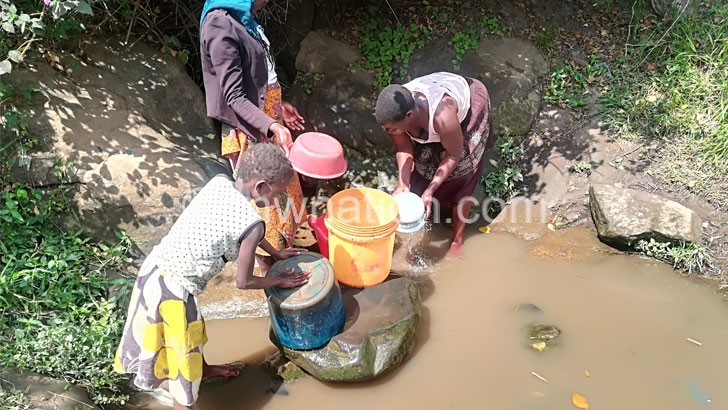By Chiwembe, villagers are living dangerously
In M’madi Village in Chiwembe Township in Blantyre, communities say they lost their sense of belonging to Malawi many years ago. So bitter is village headwoman M’madi who says since independence, her community has never had a public water facility.
“It makes me wonder if indeed we form part of Malawi,” she says. “What sin did we commit to deserve this?”

Chiwembe Township is big and with modern facilities and lifestyles, but it seems the demarcation by Limbe River created two unequal communities with M’madi area being the most ignored by authorities in provision of basic resources such as free portable water.
The chief recalls that the first source of portable water is a borehole constructed at a mosque in the area. However, it is a private property and is available for only those attending religious services at the mosque. During our visit, we found it locked.
Few years ago, villagers in the community felt relieved after seeing water pipes being planted in the area. However, the initiative only worsened the villagers’ anger. It was not a government initiative, but Blantyre Water Board (BWB) planting its water pipes to run water kiosks.
“Imagine someone decides to bring private water taps in a village like this where you find the poorest families you may think of. Where do we get the money to buy the water?” wonders the chief.
The struggle in access to portable water is written all over the village. During our visit, we found short queues at the only BWB kiosk and a larger group of women carrying empty buckets trekking down to Limbe River to draw water.
Chief M’madi says only few families are able to buy water from the kiosks for home use. She says most families buy only a bucket of water for cooking and drinking, but says this has also proved unsustainable to many.
This is confirmed by large queues of women you find at a well along Limbe River. It is a historical place. One villager, Christina Michael, 32, says the well has been in existence for over 100 years now.
“My mother used to tell me that her mother also relied on this well to draw water,” she recalls.
Although the well is less than five metres from Limbe River, the community believes the water comes from underground and is clean for consumption.
No one is allowed to wash clothes at the well. They all use Limbe River for washing and draw water for other house chores such as mopping. But chief Mmadi argues that she knows many families that rely on Limbe River only for everything.
“If you go down the village, you will not find a well and people there rely on Limbe River only,” she says. “We all believe that once boiled, water is clean and that is what I see in my community.”
She adds that some households use chlorine to treat the water before use, but says health authorities distribute chlorine only when there is an outbreak.
We tracked the river from its source downstream and recorded serious pollution levels from industrial wastes to human excreta. All the pay toilets in Limbe Market drain their waste into the river and these forms part of the water communities such as M’madi survives on. It is also the water that irrigates vegetables and other cash crops that feed both Blantyre and Limbe markets.
In 2015, Malawi was named one of the countries that achieved the Millennium Development Goals (MDGs) on access to potable water at round 75 percent. Recent statistics indicate that access to potable water is at around 80 percent and Malawi is on track to achieving Sustainable Development Goals (SDGs), particularly goal number III on access to clean water.
However, these are some of the stats that angers Chief M’madi. To her, it is a mockery that authorities continue to generalise data. Her argument agrees with those raised by water experts who punched holes in the stats released at the end of MDGs in 2015.
The experts argued that the stats on paper do not tally with the situation on the ground because most facilities being considered in the reports are either inaccessible or non-functional. One of the major arguments was that most boreholes broke down before 2015, but were still being considered as functional in the final reports.
While promising to address pollution in Limbe River to protect communities such as M’madi, BCC public relations manager Anthony Kasunda said “provision of portable water is not the sole responsibility of the council”.
Chief M’madi says she has no hope that her community will get free tap water for its people anytime soon and Limbe River will remain their savior.
“My appeal to BCC is that they should address pollution in Limbe River because the river is the only hope for people downstream,” she said sounding helpless.
The story of M’madi Village mirrors on the situation on the ground. Water for People stats indicate that over four million people in the country still live without access to portable water. These revelations maybe timely for government to retire from its slumber and ensure no one is surviving on unsafe water sources at a time the country brags to have achieved 54 years of self-rule.





